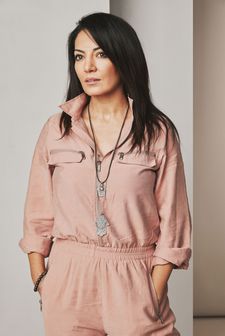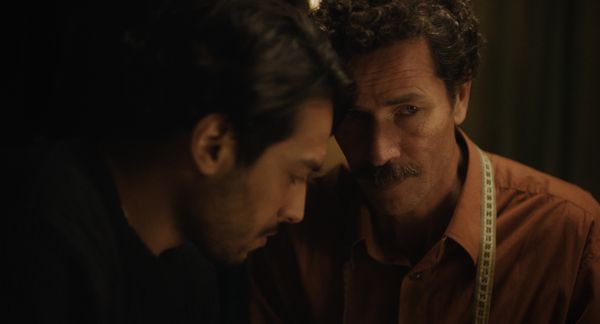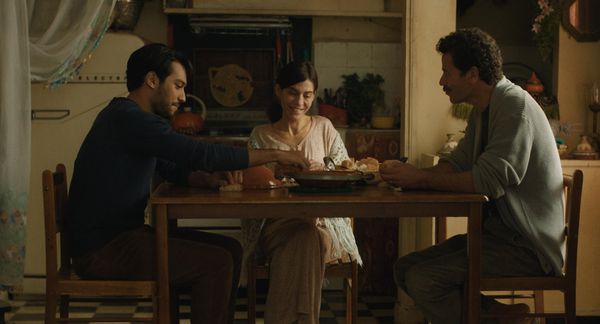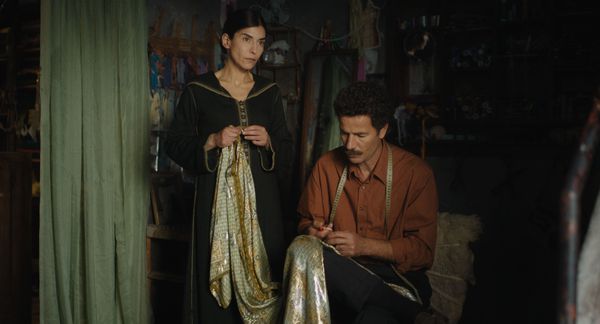The inspiration for the caftan itself - which we see Halim intricately working on during the course of the film, came from Touzani’s own family.
She says: “I actually grew up seeing my mother wearing this beautiful black caftan that is identical to the one in the film. And this is the caftan really, that inspired the fact that Halim would be a captain maker. As a little girl I would see her every time on big occasions wear this beautiful garment. It particularly fascinated me because of the very intricate work and she always explained how it had been made, the time it had taken, all the artists’ work behind it. I tried it on so many times growing up, as a little child and as an adolescent, but it was always too long, too large, too big. And then one day it fit me and so she gave it to me.
 |
| Maryam Touzani: 'What motivates me, what touches me the most profoundly is always the intimate stories of characters that can't exist openly' Photo: Portrait Studio/Carlyle Routh |
“So, unconsciously Halim became a caftan maker. I did not know that I was going to make an identical caftan to my mum's. My mum’s was black, this one was blue but the work is exactly the same. I began by looking at a lot of different embroideries. It took me months - and every time I was getting closer to the one I had actually grown up with. And one day I said, ‘I'm going to just take it out’. Because I have it in my closet, it's like a treasure.
“When I took it out, I realised this is basically what I had been looking for and I was circling back to it.”
The film celebrates the work needed to make such a delicate garment, so it was ironic when Touzami took it to a master craftsman who asked if, because she needed multiple caftan’s whether she wanted them to be machine-made in order for it to be quicker.
“I said no,” she says. “I had taken my time to plan things in advance and I really wanted every bit of it to be handmade.”
Touzani adds: “As for the blue. I mean, I didn't realise at the beginning why it was blue. But it's true that when I write it's emotional, I never plan, it's not something conscious. Almost from the very start this caftan was that particular blue. I think it's just because this colour makes me feel there's this feeling of freedom. When you look at the horizon, when you look at the sky, the ocean, there's immensity there, it's like all these different possibilities and the colour blue inspires that feeling very strongly. So I think that's naturally why it became blue.”
There’s a theme of craftsmanship and tradition running through both Blue Caftan and Touzani’s debut film Adam, which had baking at its heart. They also give her work a tactile quality.
Touzani explains: “I am drawn to things that are manual because I feel that there's a real bond that gets created between the person that's doing the manual work and the object being made. There is this kind of exchange. When you make something with your own hands, you invest yourself physically, you invest yourself emotionally, you invest yourself in so many ways. The person like Halim making a caftan, for me, I have a feeling that there is a part of the soul of that person that comes to impregnate the garment. It's so many hours spent, it's so much attention to detail. Even with Adam, with the making of the pastrie - when it's machine made, it's different, the relationship is not the same.
“And of course, there is a tradition because I believe that I am a person that loves tradition deeply and I believe tradition can be something very beautiful. It can be beautiful in the sense that it can carry the heritage of our past and that's something that I like to celebrate. But then again, I do believe there are certain traditions that need to be questioned, that need to be changed, that need to be shaken up.”
The idea of tradition and change is also something the film focuses on.
Touzani adds: “I really do believe tradition can be beautiful, as long as it doesn't keep us from being who we are, as long as it doesn't keep us from being happy, as long as it doesn't keep us from existing the way we want to exist. And I wanted for Halim to be also caught in this because Halim is torn internally between a tradition that he tries to keep alive because he loves it and between another tradition that's keeping him from being the man he wants to be. So his internal struggle is also anchored in this contradiction. But I do believe that, you know, both tradition and modernity can coexist in societies like mine, as long as we are able to question things and change certain things.”
The film sees the director reteam with cinematographer Virginie Surdej, who also shot Adam. Touzani says she loves to work with Surdej. She says: “She's an incredible person, extremely sensitive. She knows exactly where I want to go, how am I going to talk about certain scenes, how I want to show them, and the importance of light and of colour. Virgine is very sensitive to what I want, what I'm looking for, so collaborating with her has always been beautiful. When I write, the light is present, the color is present, the textures are present.”
When I suggest that her light, in Adam in particular, reminds me of Vermeer, she adds: “I love Vermeer, but then again, you know, it's never been something that I've actually reflected about before writing. Afterwards I realised you know, that there was this iinfluence. I love Caravaggio as well, his use of colour.”
Touzani says she also enjoys painting and thelook of the film is very important to her.
She adds: “For me, it's very important as well to spend time on the set design and advance in finding the right colors and finding the right textures. Because it's true that I do have the feeling that it's like composing a painting, with the the set and costume design - this color interaction for me is essential.”
One of the ways that colour makes its presence felt in the film is via the bright orange tangerines, which Mina loves.
“The tangerine is also very reflective ofher character,” says Touzani. “Her evolution as well, her health waning, this new young man that appears in their lives brings her 10 Fresh tangerines back again. There is all this that’s symbolic of the tangerine. But then there is also the visual aspect of it. Also, the taste, because when Halim is feeding her this tangerine, it's all about emotion, it's all about sensing things, I like to be as close as possible to my characters.”
Also returning from Adam is Azabal, who brings emotional and physical commitment to the ailing Mina.
“I had Lubna in mind,” says Touzani, “because when I worked with her, I realised what she was made of. I knew that I would find my Mina in her. Luna is an actress tha truly gives everything when she believes in a part and I knew that this part was for her.
“Lubna doesn't do things halfway, if she delves into a character, she will completely delve into that character and into their truth. She’s on this kind of constant quest for truth, whatever it takes, and in that we’re very close.”
Touzani adds: “She really told me, ‘I want to feel myself getting tired as I come on set every day, I want to feel the struggle as I'm acting’.”
The filmmaker says that the moment she fears most when writing a film is casting.
She adds: “I'm so inhabited. As I'm writing, I have the feeling that I'm in another world and finding the actors or actresses that are going to give them flesh for me is my biggest fear. As you write you imagine. When I wrote I imagined Lubna, so that was fine. But with Halim and with Youssef, no. So it was a long, long casting journey. The process was long, because not only did they have to be true in their parts individually, but then there had to be this kind of chemistry between them. It is a film where there are only three characters where there aren’t a lot of things going on, although there are a lot of things going on inside.”
Expanding on casting Bakri, she says when she saw him “the first thing that I was touched by was his eyes.”
She adds: “I prefer not to use words all the time, I try to rip up the dialogue to its very essence. I think that the emotion can be expressed through different little gestures, through glance through very little details that we don't necessarily see. And when I saw Saleh’s eyes, I felt that there was a kind of humanity that for me, really reflected Halim.”
Casting the younger man was harder as it’s a role built on gesture and restraint.
Touzani explains: “In acting, I like all the things that are on the verge of coming out. And so when I met Ayoub I was touched by him, because there was something very passionate in him about acting. He had never acted before, he had had two little parts in a TV series, but he was passionate about acting, and he had left his past life in order to become an actor. And that passion in him really touched me. And I felt that there was a real talent to bring out, you know, and an understanding of the character because once again, that was essential for me to bring out.”
What’s next isn’t yet set in stone for Touzani but she adds: “What motivates me, what touches me the most profoundly is always the intimate stories of characters that can't exist openly. I've realised only now that I've always been captivated by these untold stories, by these people who you don't necessarily see, who don't necessarily have a voice or don't necessarily have a face. And it's always been those characters that make their way inside me and that eventually ended up making their way into a film.”
The Blue Caftan is released in UK cinemas by New Wave on Friday, May 5
























